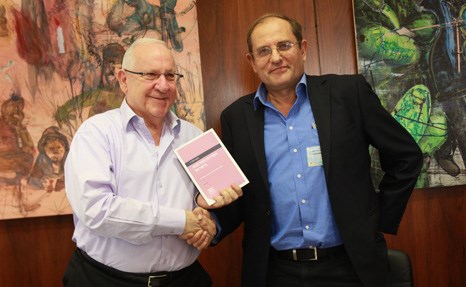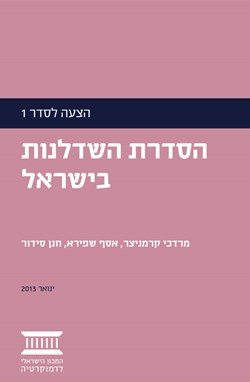Regulation of Lobbying in Israel
- Publication Date:
- Cover Type: On-line Booklet
A proposal for the regulation of lobbying in Israel prepared at the request of the Knesset by an IDI research team headed by IDI Vice President Mordechai Kremnitzer and researchers Hanan Cidor and Assaf Shapira.
At the request of the Knesset, an IDI research team headed by IDI Vice President Mordechai Kremnitzer and researchers Hanan Cidor and Assaf Shapira drafted a proposal for the regulation of lobbying in Israel. This proposal was presented to Knesset Speaker Reuven Rivlin on January 3, 2013. The proposal is based on the assumption that lobbying is a legitimate and—when conducted properly—even desirable activity in a liberal democracy. In order to prevent inappropriate lobbying efforts, however, it is important to ensure transparency and systematize supervision of lobbying.
An English summary of the recommendations and the full document in Hebrew can be found below.

Prof. Mordechai Kremintzer presents the IDI proposal to Knesset Speaker Reuven Rivlin
In a liberal-democratic regime, lobbying is a legitimate, unavoidable, and—when conducted properly—even desirable activity. Lobbying can be a reflection of the principles of representativeness and voter participation, and can provide decision makers with information vital to their work. But lobbying also has some potential ramifications that are negative: it may grant excessive influence to those with economic power; it may offer decision makers biased, and even misleading, information; it may compromise transparency, since it takes place in small forums; it may undermine the public's confidence in the decision-making process and in democracy as a whole, and it may disrupt the work of decision makers.
When the public believes that lobbyists are running the Knesset, or that some Knesset members dance to the tune of lobbyists, public confidence in the Knesset is severely eroded. Consequently, steps should be taken to reduce unregulated lobbying, to tighten supervision of lobbying, to increase transparency in lobbying, and to boost enforcement and penalties when the rules are broken. All of this should be done with the aim of preventing lobbyists from interfering with Knesset members and personnel as much as possible and preserving equality between lobbyists and other citizens, except when imposing special restrictions on lobbyists is justified due to the unique nature of their activities. We believe that the restrictions offered in our proposal, which are subject to the provisions of Basic Law: Freedom of Occupation, are proportionate and do not restrict the activity of lobbyists too severely.
We propose that the Knesset Law and the Knesset bylaws be amended as follows:
- To regulate the activities of lobbyists who are permanent employees of a given organization and who engage in lobbying activities only on behalf of that organization ("in-house lobbyists"), in accordance with the regulations that apply to commercial lobbyists employed by lobbying firms.
- To regulate extra-parliamentary lobbying through legislation. This would also include lobbying government officials and senior officials of the executive branch.
- To increase the "cooling-off period" during which former Knesset members and government ministers may not become lobbyists to one and a half years. This period would also apply to senior officials of the executive branch.
- To require lobbyists to submit an annual report of their work, which will be published on the Knesset website.
- To amend the requirement of full disclosure such that lobbyists are obligated to indicate the specific special interest for which they are lobbying.
- To extend the Speaker of the Knesset's authority to impose administrative sanctions, including the revocation of permission to engage in lobbying activities in the Knesset
- To define the four prohibitions presently included in the Knesset Law and additional prohibitions—some of which are proposed above—as criminal offenses, subject to fines.
In addition, we propose the following procedures:
- To make the issuing of a permanent Knesset entry pass to lobbyists contingent upon their signing of a written commitment to uphold the code of ethics of the lobbying industry. The issuance of a permanent entry pass to those who are not registered lobbyists would similarly be dependent on the recipient's signed commitment not to engage in lobbying. The personal details of individuals who have permanent entry passes will be published on the Knesset website.
- To regulate the entry of lobbyists to areas of the Knesset designated for professional personnel (in order to avoid their uncoordinated entry) and to bar them from the area near the entrance to the Knesset plenum.
- To equalize the status of lobbyists with the status of all other citizens with regard to entering the Knesset members' cafeteria.
- To prohibit contact between lobbyists and the Knesset Secretariat and prohibit the entry of lobbyists to the area of the Speaker's chambers and the Knesset Secretariat
- To publish all decisions on issues related to the Knesset plenum and Knesset committees on the Knesset's website at the earliest opportunity. A telephone information center should be established to enable citizens to receive reports on the decisions in real time until such time as the decisions are published.
- Regulations regarding Knesset committee meetings:
a) At every meeting of a Knesset committee, the names of all those present as observers should be recorded in the minutes, which will state explicitly which observers are lobbyists and what bodies they represent.
b) Those present as observers at Knesset committee meetings will not be allowed to have private conversations or make contact with Knesset members during the deliberations.
c) Lobbyists who appear before a Knesset committee will identify themselves as lobbyists, will state the body they are representing, and will reveal the nature of the matter that they are representing.
d) Committee chairs will ensure that all relevant interests and positions are represented at the deliberations by inviting speakers who represent all sides of the issue to address the committee and by allocating time fairly to the speakers in attendance.
e) Individuals who are invited to appear before the committee will be asked to send a written synopsis of their remarks in advance. This summary will be published on the committee's website prior to the deliberations. - Regulations regarding contact with the secretariats of Knesset committees:
a) Lobbyists will have the same status as other citizens with regard to contact with the professional staff of the Knesset committees.
b) All decisions of the secretariats of the Knesset committees and any changes in the way the committee sessions are to be conducted, including changes in the wording of draft bills, will be published on the committee websites as soon as possible, and at least seven days before the session.
c) The access of citizens to the professional staff of Knesset committees will be regulated, in order to avoid any uncoordinated physical access. As described above, until such time as real time publication decisions, changes, and submissions on the committee websites is instituted, a telephone information center will be established in the Knesset, which will provide updates and information to all those who are interested.
d) Anyone will be entitled to approach the Knesset Committees staff in any matter by emailing the committee. Among other things, it will be possible to ask the professional staff of a Knesset committee for a meeting. Knesset employees who receive such submissions from the public will record the identity of the submitter and the content of the document. Based on the recommendation of the committee's professional staff, and on the decision of the committee chair, these documents will be distributed to the committee members and uploaded to the committee's website. All background material will be published at least 48 hours prior to the relevant session (unless the content is classified).
e) Those present at Knesset committee meetings—lobbyists and other citizens—will be entitled to apply orally to the professional staff of the committee in order to ask for clarifications of decisions and changes to bills that were made in real-time; permission to speak, in order to argue against such decisions and changes; and postponement of the meeting, in order to prepare a response to such changes. - Regulations regarding the Knesset Research and Information Center:
a) The Knesset will publish an e-mail address that will be the sole channel for contact with or submission of research-related material to the Knesset's Research and Information Center. All such contact will be documented.
b) The resource base of the Knesset Research and Information Center will be expanded. - Staff members of the Legal Department of the Knesset will be instructed not to meet or speak with lobbyists unless such contact is approved by the Knesset legal advisor, except for requests for clarifications of wording of an act or administrative regulation.
- The Speaker of the Knesset will appoint a special advisor who will be responsible for lobbyists in the Knesset. This advisor will have supervisory authority over lobbyists and will verify that their work is carried out within the law and in accordance with the procedures proposed in this document
- Tags:
- ethics,
- regulation

